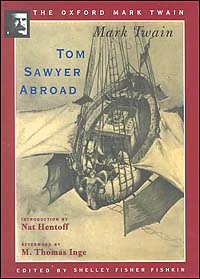
 |
I'm having a hard time coming up with books on your typical high school syllabus for which this assignment would be appropriate. Take Adventures of Huckleberry Finn. What kind of grade would a ninth-grader get if he followed up Huck and Jim's journey down the Mississippi by putting them and Tom Sawyer on, like, a huge winged blimp and had them fight a mad scientist and then fly around the Sahara and get chased by lions and stuff? 99% of English teachers would give it a low grade for being preposterous and completely violating the tone of the parent work. And the other 1% would give it a low grade for plagiarizing the actual sequel, Tom Sawyer Abroad.
For Mark Twain, deeply in debt, did in fact take all of a month to bang out this very tale, hoping it'd be the first of a long series of novels in which he'd take Huck, Tom and Jim, send them via blimp to various exotic locales, and rake in some quick bucks. The parallel that springs to mind is a flimsy little song I was listening to recently by a band that's done some amazing stuff. I looked at the liner notes to see why it was such a half-assed effort and it turned out that the band had banged it out as the theme song for a sitcom.
Most of the book consists of conversations in which Tom spouts off about something he's read in a book and Huck and Jim pooh-pooh it. What I found interesting was that in the similar bits in Huck Finn, Tom would say something like "we need to fill Jim's room with rats and spiders because the prisoners in adventure books all have to deal with rats and spiders" and Huck would confide to the reader that he thought Tom was crazy. In Tom Sawyer Abroad, Huck still thinks Tom is crazy, except this time Tom's wacky ideas are things like "time zones exist" and "you can't reach a mirage." For the first half dozen or so of these conversations Twain has Huck or Jim say something that's so preposterous that Tom has no comeback, and then Huck and Jim take it that they've won the argument (as when Huck declares that either states are different colors — Illinois green, Indiana pink, etc. — or else their map is lying and they should throw it away). And yes, we're supposed to laugh at the sheer illogic of Huck and Jim's reasoning... but there's also an element of being prompted to laugh at Tom — that is, while it's true that Huck and Jim are set up as The Dumb Guy, and people like to chuckle at The Dumb Guy, they also love it when The Dumb Guy triumphs over The Smart Guy. (Hell, "let's laugh at the smart guy" was a big part of Bush's campaign in 2000.) This makes for an irritating book until finally, about halfway through, there's a bit in which they're all quite literally dying of thirst and Tom figures out where the nearest oasis must be — and though Huck and Jim beg him to turn the blimp around for fear of bad luck spawned by "ghost lakes," the fact that Tom actually has a brain saves the day.
If memory serves me right, this makes for a decent segue to Pudd'nhead Wilson. I guess I'll find out.
